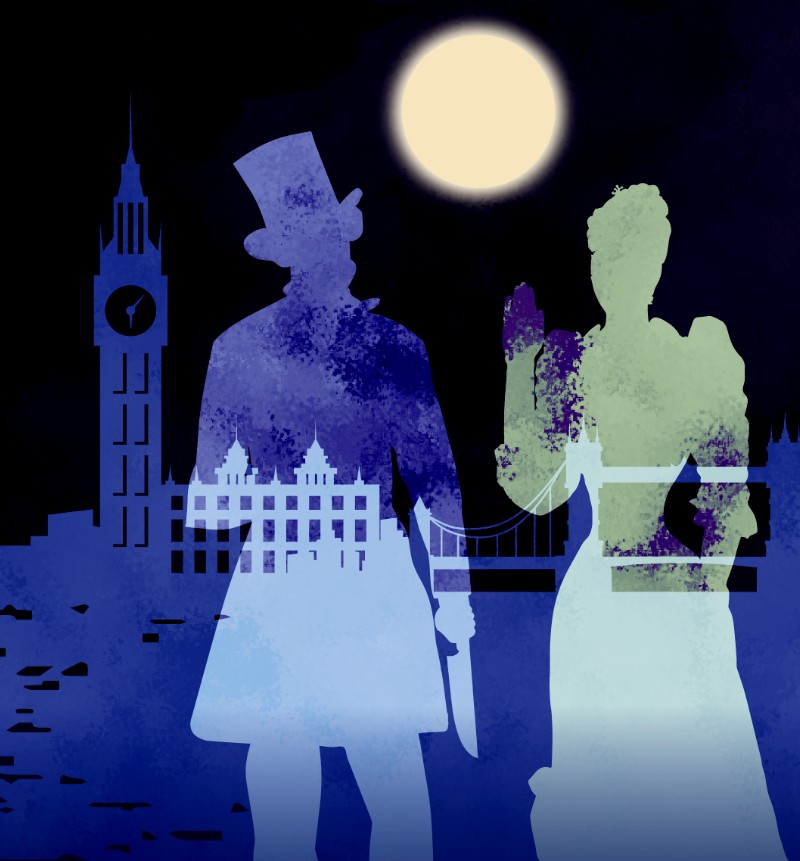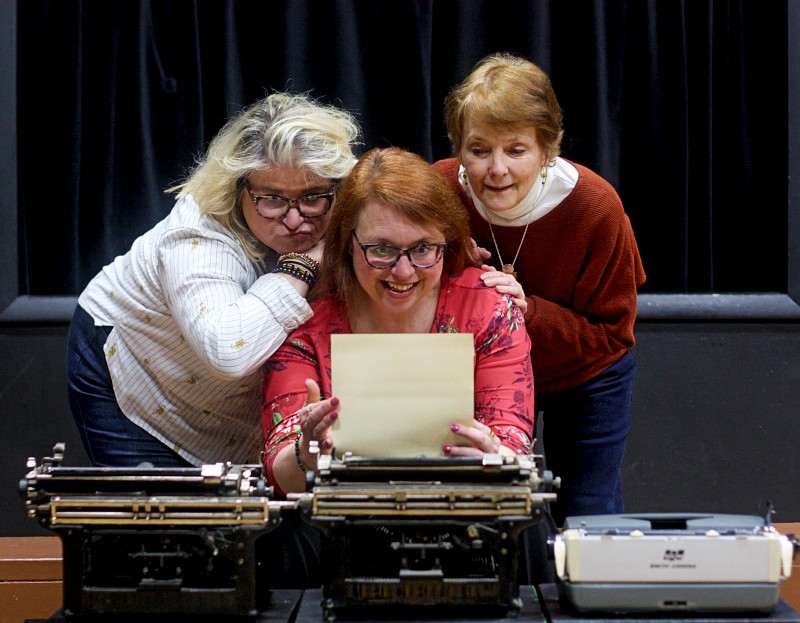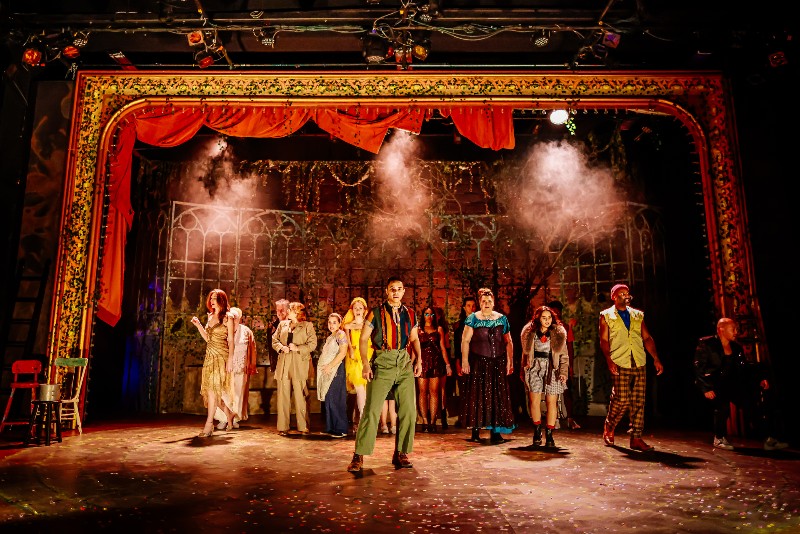U-M Presents a Swirling, Perfect Staging of Stephen Sondheim's "A Little Night Music"

It always amazes me.
Every year, the University of Michigan School of Music, Theatre & Dance is a magnet for the best, most talented musical theater stars on the horizon.
This weekend, all that training and dedication pays off in a swirling, funny, poignant, and smoothly executed production of A Little Night Music, with music and lyrics by Stephen Sondheim and book by Hugh Wheeler. Here, a large cast can show their innate talent and what they’ve learned on their way to future stardom at the Power Center for the Performing Arts.
Director Telly Leung, music director and conductor Catherine A. Walker, and choreographer and student Davey Burton Midkiff bring it all together.
A Little Night Music is, as a note says, “suggested by a film by Ingmar Bergman.” In U-M’s production, Wheeler keeps the main characters and the late 1800s Swedish setting. It’s mid-summer when the days run long, and a yearning for love is in the air. Wheeler makes room for Sondheim’s excellent music and razor-sharp lyrics, but also makes subtle changes that bend Bergman’s film in complex ways.
Encore Theatre hosts "Love Boat" vets in engaging, thoughtful "I’m Not Rappaport"

You remember The Love Boat? Sure you do.
On Saturday nights from the mid-'70s to the mid-'80s, the captain and his crew would help passengers find love, laughs, and life lessons.
Encore Theatre is taking a brief break from presenting musicals to showcase Herb Gardner’s I’m Not Rappaport, a funny, engaging, and thoughtful look at aging in the big city. It’s a perfect opportunity for a Love Boat reunion, bringing together Fred Grandy as the cruise ship purser Gopher; Ted Lange as Isaac Washington, the ship’s genial bartender; and Jill Whelan as Vicki Stubing, the captain’s daughter.
Two old men share a park bench in New York’s Central Park. Midge Carter (Lange) claims the bench for himself, a place where he can read a newspaper and hide from his obligations as a building superintendent. Nat Moyer (Grandy), a lifelong political lefty, loves to talk and wants to share his endless stories with the wary Midge. They’re an odd couple, who learn just how much they need each other.
Director Vincent Cardinal draws excellent performances from his veteran stars. They bring years of experience and a real love for the play they’re presenting. Cardinal balances physical comedy with the snappy and telling conversations that are the real heart of the play.
U-M’s take on Anton Chekhov's "Cherry Orchard" balances an awkward blend of comedy and tragedy

Is it a tragedy or a comedy?
Anton Chekhov, master short story writer and playwright, believed he had written The Cherry Orchard as a comedy, taking a jab at a rapidly fading way of life in rural Russia. When director Constantin Stanislavski directed the play for the Moscow Art Theatre in 1904, he directed a tragedy about a social order soon to be eclipsed by a very different social order.
The University of Michigan’s Department of Theatre and Drama balances the two points of view with mixed results.
In his program notes director Daniel Cantor acknowledges the shifting tone that leaves room for very different points of view.
Cantor writes, “What’s fascinating to me about The Cherry Orchard is that it contains intense contradictions: contradictions in style, theme, and action, and highly contradictory characters. It fully occupies a tragicomic perspective that is always moving, shifting, turning on a dime—whipping from the profound to the farcical, the spiritual to the absurd. And sometimes both at once.”
Theatre Nova's "the ripple, the wave that carried me home" explores how a family deals with a long fight for social justice

A social change agent who’s also a parent lives inside a paradox: Though they’re often driven by hopes of making the world a better place for their child, they must necessarily invest a vast amount of time and passion (that might otherwise be spent on the child) into their cause to even have a chance at moving the needle—and that child’s resentment can all-too-easily take root and grow.
This is one of the primary conflicts at the heart of Christina Anderson’s play the ripple, the wave that carried me home, now on stage at Theatre Nova. The 90-minute drama focuses on Janice (Bryana Hall), a woman living with her husband and sons in Ohio in 1992 as the L.A. riots—sparked by acquittals for the police officers who brutally beat Rodney King—unfold on television.
A Devilish New Comedy: David MacGregor's "The Antichrist Cometh" debuts at The Purple Rose Theatre

David MacGregor's plays have been performed in 15 countries, including India, Israel, South Korea, and Tasmania.
But the Michigan-born artist develops most of his world premieres right here at home.
Among the works the resident playwright for The Purple Rose Theatre Company debuted on the Chelsea stage are his Sherlock Holmes trilogy, Vino Veritas, Gravity, Consider the Oyster, The Late Great Henry Boyle, and his latest play, the hilarious The Antichrist Cometh, which begins previews there on March 22 and opens March 29.
John, an advertising exec, hasn’t seen Duncan, his old college roommate, for years. John and his wife, Lili, have Duncan and his fiancée, Fiona, for dinner. Fiona is devoutly religious and notices things that bring her to a startling conclusion:
John is the Antichrist!
“The basic idea for this play occurred to me a long time ago," MacGregor says. "I’m not personally religious, but I’ve read the Bible and Koran because they’re such important and influential texts. The Book of Revelations says the Antichrist will arrive on Earth."
MacGregor named his protagonist John, referencing the Book of John and the letters of John, but says, “John is a regular everyday guy who gradually realizes he might be the Antichrist.”
Through the Grisly Maze: "Elizabeth Cree" is a puzzle-filled operatic mystery

As the opera begins, Elizabeth is hung for the murder of her husband, the playwright John Cree.
Is she guilty of poisoning him?
John is a serial killer, in the fashion of Jack the Ripper.
Or is he?
You’ll have about an hour and a half to solve the puzzles in Elizabeth Cree, which unravel in 29 scenes and over four timelines and include plays and vaudeville within an opera.
“It’s an interesting and complicated piece,” says Gregory Keller, who directs Unversity of Michigan opera students in this one-act chamber opera, sung in English, that runs March 21-24 at the Lydia Mendelssohn Theatre. Likening it to a hedge maze, he says, “We’re presenting it as a theatrical puzzle, a house of mirrors that the audience gets lost in and, maybe, found in. Each time you go into the maze, you make another connection.”
It’s so much so that conductor Kirk A. Severtson, who coordinates opera at U-M, says audiences who see it twice will delight in discovering Easter eggs, once they know what happened. “You have to see it more than once to get all the nuances,” he says.
But those who see it once will have a chance to figure out just what is happening, after observing three gruesome murders almost in front of their eyes: Keller opted to stylize the crimes, presenting them as Victorian shadow plays.
Six-Pack of Shorts: Ann Arbor Civic Theatre tackles David Ives' comedy anthology "All in the Timing"

When Bruce Morey was looking for a play to direct for the Ann Arbor Civic Theatre, he wanted a comedy that would engage a large cast and that wouldn’t be too time-consuming for cast members. Instead of one play, Morey found six plays in one package, David Ives’ All in the Timing.
“I wanted to do a comedy that didn’t have any heavy issues about it, just fun,” he said. “All in the Timing is a series of 10-minute plays and I wanted to explore 10-minute plays, which I think is great for community players because you can put a lot of people into these plays if you do it right. They’re shorter, so for people who work full time and have lives outside of theater, this is a great experience for them because they can come in and do a 10-minute play or a 15-minute play and maybe it’s their first experience with it. It’s self-contained and ideal for community players.”
The Ann Arbor Civic Theatre will present Ives’ six-pack of short comedies, March 14-17 at the Arthur Miller Theatre in Ann Arbor.
Director Morey and producer Nicole Arruda are working together on producing and directing.
A Jill of All Trades: Julia Garlotte takes the helm of The Penny Seats Theatre Company

A theater's artistic director has to oversee everything on stage. She also has to check in with financial managers so the production stays on budget, and she has to understand acting, directing, and design—the whole deal.
Julia Garlotte, the new artistic director (AD) of The Penny Seats Theatre Company, is the whole deal.
Garlotte has acted for The Purple Rose in Chelsea, The Encore Musical Theatre Company in Dexter, and Penny Seats in Ann Arbor as well as at some of the town's lost theaters: The Performance Network, The Blackbird, and The New Theatre Project. Audiences have seen her at other theaters throughout Southeast and Central Michigan, too.
She has also designed sound for several theaters, recorded audiobooks, and recently she’s been directing.
Oh, and Garlotte managed the box office at The Purple Rose for 12 years.
The “sheer volume of her professional experiences” is one of the things that impresses Penny Seat’s outgoing AD, Joseph Zettelmaier.
In addition to working with Penny Seats as an actor, she's also been a sound designer, sound engineer, assistant director, and director for the company.
Encore Theatre's take on Stephen Sondheim’s fairy-tale mashup "Into the Woods" is filled with powerhouse vocals

It’s fitting that I watched Encore Musical Theatre Company’s new production of Into the Woods with my 12-year-old daughter.
Not just because the girl can sing every word of the show’s patter song (“Your Fault”)—she used to fall asleep listening to the show’s cast recording each night—but also because she now lives in that interstitial, fog-laden forest known as middle school, where preteens blindly fumble their way out of childhood.
And frankly, if I had to name one show that’s about the terrifyingly fraught and difficult process of growing up, it would be Stephen Sondheim’s Into the Woods.
A fairy-tale mashup that premiered on Broadway in 1987—long before the word “mashup” became such a regular part of our lexicon—Woods interweaves the stories of Cinderella (Ash Moran), Rapunzel (Lucia Flowers), Little Red Riding Hood (Sienna Berkseth), and Jack (Tsumari Patterson) and the Beanstalk.
How? By way of a cursed baker (Marcus Jordan) and his wife (Jessica Grové), who can’t have children until they gather the four items requested by the old witch next door (Jennifer Horne). But even when the couple succeeds, and everyone—fairy-tale protagonists included—gets what they want, in its darker second act Woods dares to venture beyond “happily ever after” and ask, “OK, now what?”
Insulation Versus Isolation: U-M's production of “Arbor Falls” holds a mirror to society's divisions

Caridad Svich’s play Arbor Falls is set in a small, landlocked, tree-lined town of that name. We know little about the town, save that it is near another place where something terrible happened, and the people of Arbor Falls want to feel safe. We know, too, that it is home to a church with a dwindling congregation and a preacher unsure of his faith.
In one scene, the preacher says they don’t think about what to say in their sermon but what to leave out. In this play, much is left out, too. Only one character is named other than by title (Preacher, Lover, Owner), and none have specific genders; pronouns are gender neutral. The dialogue—short lyrical lines, lacking in detail—also leaves a lot for the actors and director to imagine.
Into Arbor Falls comes a stranger, a traveler nobody knows, who makes “odd” sounds when praying. Preacher offers them safe harbor and food. But who is this stranger? Can they be accepted here?
“I’ve been really excited about the way the cast and production team have embraced the project,” says Tiffany Trent, chair of the University of Michigan’s Department of Theatre and Drama and director of Arbor Falls, which makes Michigan premiere on February 15 at Lydia Mendelssohn Theatre.
For Trent, a major theme is insulation versus isolation.


































